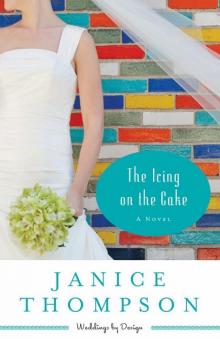- Home
- Janice Thompson
Boxed Set: Deep in the Heart of Texas Page 2
Boxed Set: Deep in the Heart of Texas Read online
Page 2
“The Tremont has quite a history.” The clerk gestured around the room. “President Lincoln visited in 1860.”
“Beg your pardon, but that was President Grant.” Brent tried not to appear sarcastic, but found it difficult. “And it was 1880.”
“Yes, well...”
Brent continued... “It’s also rumored that Rutherford Hayes, Grover Cleveland and Benjamin Harrison have signed your registry at one time or another. Not to mention James Garfield, Buffalo Bill Cody, and Chief Spotted Horse.” Brent couldn’t help but grin as the clerk’s face fell dramatically. “Don’t let it get to you, my friend,” Brent said with a laugh. “I grew up on the island. My parents are still here.”
“Then why...?”
Brent gave him his best, “Don’t even ask” look. He glanced down before reaching for his bags. “I’ll be headed home soon,” he said curtly. “In the meantime, where can I get a paper?”
“I’ll have The Daily sent up to your room, sir. First thing.
Brent gave him a look that could not be avoided.
“Perhaps you would prefer The Tribune?”
“I’ll be wanting to look at The Courier,” Brent said with a smirk.
“The Courier?”—The old man laughed. “No one much reads that one anymore.”
Brent gave him another quick glance. “I’m a journalist,” he said proudly. “And I used to work for The Courier. So if you don’t mind…”
“I’ll have it sent right up, sir. You’ll be in room 203.”
Brent nodded, then turned in curiosity as a group of well-to-do men and women entered the lobby together. Leading the way was a woman with a feather in her rather large hat. She clutched a leash in her soft, white hand. An Afghan hound, quite large, pranced across the lobby at her bidding, nearly as uppity as she.
Clearly these folks embraced the lifestyle he had left behind – an ocean of leisure money had dressed these people in their posh hats and silk ties. He couldn’t fault them. They were here as tourists and the city needed as many as possible to keep the economy going. He smiled in their direction and headed toward the stairs.
Minutes later, Brent settled into the posh room. He melted into the thick beige coverlet on the tall four-poster bed. Large conch shells, polished and glistening sat perched atop the large pin wardrobe. Brent picked one up and placed it next to his ear. The pull of the sea gripped him at once. He had forgotten how strong it could be. He quickly placed the shell back on the wardrobe.
Minutes later, Brent balanced a cup of coffee in his left hand, a pen in his right, and his journal on his knee.
Galveston Island... home of fifteenth century pirates and twentieth century businessmen and entrepreneurs. Not much difference to be noted between the two. However, after life in New York City, this place seems almost backward. Most of the Islanders move along at a languid pace, one that seems far too sedate for my taste. And yet, in some respects, they are far more civilized than I.
I sit, near happy, in the infamous Tremont. Men of fame have probably slept in this very bed, tucked away in comfort. And yet I fear I will not find must rest in it. Not when my own home is only blocks away.
A knock at the door startled him. Brent stood, accidentally spilling the cup and scalding his left knee. Hobbling, he made his way to answer it. “What do you want?” He yanked open the door.
A bell cap greeted him, eyes wide, with paper in hand. “The Courier, sir. Just as you requested.”
“Thank you,” Brent’s eyes automatically shifted downward. It wasn’t this boy’s fault he was in such a bitter mood. As a token of kindness, he dropped a coin in the fellow’s hand.
“Thank you, sir.” The boy tipped his cap. “Have a pleasant day.”
“Same to you.” Brent closed the door and turned back toward the bed, anxious to get some rest. Something in the glass caught his attention. “What in the...?” Were those eyes in the window? But he was on the second floor. It wasn’t possible! Still...
Brent tiptoed toward the window, slowly, cautiously. A reflection of the lamp. That’s all he’d seen. Not eyes at all. No one was watching him. Not here.
***
Tuesday, September 4th, 5:40 p.m. The Galveston Courier
Everett Maxwell, editor of The Courier, ran his finger down the page as he read. “Not much of a story,” he mumbled, jabbing his finger at an article on beach erosion. “We’ve got to do better than this.” He wasn’t speaking to anyone in particular. In fact, he was quite alone in the drab upstairs office.
As much as he hated to admit it, there had been little worth writing about in recent days. Fashion fads had come and gone, with skirts rising above the ankle and then falling again. Factory workers had their share of complaints, to be sure, but he had done enough exposes on their plight to turn the hearts of all who might consider turning. William Jennings Bryan had come to the island in the spring to campaign for presidency, of course, but that was old news now. They had already stretched that story as far as it would go, anyway. The stories that dominated headlines these days were focused on garden parties, Opera House events and the like. Nothing terribly exciting.
He stood and glanced out the window as Islanders rushed up and down The Strand. A well manicured young woman with a crisp white hat and blue bow caught his eye. Her white gloves glistened in the sunlight. She was the picture of a perfection and provided quite a contrast to what he saw next – an elderly woman with a worn hat and graying hair. And yet they both nodded at each other as if they were old friends. Not everyone on the island was as snobbish as he accused them of being.
And so what if they were? Many felt they had reason to be. “The Wall Street of the Southwest”—that’s what folks called his beloved Island. Galveston… "a city of splendid homes and broad clean streets; a city of oleanders and roses and palms; a city of the finest churches, school buildings, and benevolent institutions in the South..." that, according to Clarence Ousley, editor of The Daily, Galveston’s leading paper. Well, let him use the niceties. Everett was tired of it. He was ready for some adventure, some action.
Even the buildings along The Strand didn’t impress him much anymore. He gave them another look. They were well-constructed, quite nice in appearance. He could certainly do worse for a view. It was a pretty impressive row of buildings and businesses with electricity and telephones—all of the modern conveniences. And yet it only seemed to leave him aching for something else. These buildings contained no stories – and what he needed right now were stories.
There had been some great ones in the past, to be sure. In fact, his first big break as a young reporter had come in 1885 with the great fire that had swept across the island, destroying lives and properties. Though he hated to admit it, the adrenaline rush accompanying the story had been a writer’s dream. Why was it that journalists were always so excited when bad things happened? Just because it made good news?
“What The Courier needs is a story,” Everett muttered. “A real story...”
***
Tuesday, September 4th, 9:17 P.M. (The Sanders Home)
Emma Sanders flitted around the quaint bedroom, all a’twitter. She spun in front of the vanity, where younger sister, Sadie, sat brushing her curly chestnut hair.
“Oh, Emma,” Sadie spoke gleefully. “It’s all so wonderful!”
“Isn’t it,” Emma echoed with a rush of pride. She had waited for this day for years, and now, finally, it was upon her. She glanced in the large round mirror above the vanity at her reflection. Her cheeks were flushed – probably from the excitement, though the heat certainly didn’t help. She snatched the hairbrush from Sadie’s unsuspecting hand and ran it through her own brown curls. They cascaded down onto her shoulder.
“Do you mind?” she asked with a giggle.
Sadie grabbed it back. “Do you mind?”
Emma put a dab of fragrant Jasmine oil behind each ear, turning to the right and then the left. “I’m so excited, honey. But tell me—do you like my dress?” She pranced about i
n her bright white ankle-length frock and matching shoes, waiting for her sister’s stamp of approval. Tomorrow she would wear it for real—for the very first time.
“Oh my, yes. You look, you look -”
“Well, go ahead and say it,” Emma exclaimed.
“You look angelic.”
“Hardly angelic,” Emma said, brushing back a loose hair. “But tell me, do I look the part?”
“Do you ever.” Sadie looked at her from every angle. “How does it feel?”
“Oh, in many ways just as I expected,” Emma said, “although I imagine it’s not going to turn out to be all one might hope.”
Sadie’s face fell immediately. “Someday I may want to be in your shoes, but if it’s no fun, then maybe I’ll reconsider now and save myself the trouble.”
“Save yourself the trouble? You silly goose.” Emma laughed heartily. “Don’t give up the ship before it’s even set to sea, little sister. You’re only thirteen, after all. Someday, I promise you—someday you’ll stand in this same dress and join the ranks of every other young woman who ever gave her life selflessly to another.”
“You make it sound so wonderful,” Sadie said with a sigh. “So very wonderful.”
“I’m a hopeless romantic. That much is true.”
Sadie sighed. “Me too. But truth be told, I am a little jealous. I’ve tried not to be.”
“You are?” Emma smiled.
“Yes,” her little sister said with a sigh. “Oh, Emma! I can hardly wait to become a nurse like you.”
They threw themselves onto the bed and giggled until each was thoroughly exhausted.
“I want to be pretty like my big sister,” Sadie said, coming up for air.
“You little nit-wit! You are lovely.” Emma took the pillow and hit her younger sister in the head with it.
“No I’m not,” Sadie rolled over and gazed at her mournfully. “My eyes are hazel – plain and dull. Yours are cornflower blue. I’m so jealous.”
“Cornflower blue? You’re so dramatic, Sadie.”
“I’m not. And if I were pretty, I’d be the envy of all the other girls on the Island at my debut.”
“Your debut?” Emma doubled over with laughter. “You know that only the rich girls have a coming out party. Can you imagine the money their parents much put out? Those uppity folks!”
“They’re high as cat’s backs,” Sadie said with a sigh.
Emma laughed. “That they are. Girls like us, on the other hand—we go to work at the sewing factory, or, if we’re lucky, the hospital. And the boys who attend social functions with the girls from Broadway wouldn’t give us a second glance.”
“Life is so unfair,” Sadie pouted.
Emma stood, looking carefully at her reflection in the mirror. True, her eyes were a lovely shade, but she had grown a little too prideful where they were concerned. Of course, right now she had far more important things on her mind. “No more time for this,” she said, as a yawn escaped her lips. “I’ve got to be up early in the morning, and I need my beauty sleep.”
“Do you ever.” Sadie snorted.
“Now listen up, you, you...” Emma took the pillow and hurled it at her sister. The pillow fight that developed was enough to awaken their parents in the bedroom below.
“Girls, get to sleep.” Their mother’s voice rang out, startling them.
“Now see what you’ve gone and done?” Sadie gave her a playful grin.
“Who, me?”
“Yes, you! You’re going to get me in trouble. You know they always think I’m the one to blame.”
“Well, aren’t you?” Emma couldn’t help but laugh.
“You just wait and see, smarty-pants. Someday I’ll show you who is the better sister!”
“Well, if that doesn’t beat all.” Emma tossed her curls defiantly and promptly whacked Sadie with the pillow again.
“You’re going to hurt me.”
“That’s all right,” Emma hit her once more. “After all, I’m a nurse. I can always make it better again.”
***
Tuesday, September 4th, 9:22 p.m. St. Mary’s Orphan’s Asylum
Sister Henrietta Mullins tucked the girls in for the night. Their dreary second floor dormitory felt about as homey as a hospital ward with its stark metal beds and thin mattresses. Thankfully, most of the youngsters were already asleep. There was one youngster who struggled with bedtime each night. Henrietta knelt at the little girl’s bedside in quiet reflection as she prayed. “Now I lay me down to sleep... What’s the rest, Sister?”
“I pray the Lord my soul to keep.” Henrietta opened her eyes just a bit to peek at the nine-year-old. Lilly Mae was new to the St. Mary’s and needed all of the encouragement she could get. Her parents, immigrants from Italy nearly ten years prior, had lost their battle against yellow fever when the epidemic had struck the Island. Like so many of the children at St. Mary’s, Lilly Mae had struggled to find a way to adapt.
The beautiful youngster had coped the only way she knew how—through her music. The olive-skinned darling had been raised by kind-hearted, giving parents who loved opera. They had always encouraged her to sing. Already she possessed a voice that could easily parallel some of the older women on the island. But any hopes of pursuing her dream to sing had seemingly died with her parents on that shrimp boat.
“I pray the Lord my soul to keep,” Lilly Mae continued. “If I should die -” Here she paused dramatically. When she did speak, it was almost enough to knock Henrietta off her knees and directly onto the floor. “Can’t we just leave out that part? I don’t wanta die, Sister Henri.”
“Well, I don’t want you to die either, baby,” the nun answered. “But we must be ready, just in case.”
“I’m not ready,” Lilly Mae spoke defiantly. Her dark brown eyes flashed madly. “And I’m not going to pray that part. I’m not!” Crocodile tears sprang from those eyes, and she wiped at them with the back of her hand. Henrietta understood the child’s wishes to appear strong. They were a lot alike, perhaps more so than the youngster would ever know.
Lilly Mae hopped up onto the bed, pulling the sheet over her head, muttering all the while. “You don’t think God will be mad at me, do you?” she mumbled through layers of sheets. “’Cause I wouldn’t pray it...?”
Sister Henrietta stood silently, shaking her head. How could she correct one so young who had just lost so much? “I sincerely hope not,” she answered finally. “Though, of course, I cannot answer for Him.”
How she wished she could.
Chapter Three
Wednesday, September 5th, 4:53 p.m. The Tremont Hotel
Brent pounded his clenched fist into the feather pillow and shaped it to his liking. ”Just a few hours of sleep,” he muttered. “That’s all I’m asking.” Exhaustion overwhelmed him, but his mind wouldn’t allow him to rest. The rhythm of the train still held him suspended in time. Brent closed his eyes, but the clack, clack, clack refused to release him.
This wasn’t the first night he had struggled to doze off. In fact, he hadn’t managed a good night’s sleep since the train pulled out of Grand Central Station in New York. His years in New York were a blur now and their memories brought a mixture of pleasure and pain. He had traveled to the farthest place he could think of to find himself. What he had found, what he had discovered, was his need for something real, something lasting.
The crazy, concocted headlines he had written were as fleeting as his feelings of job security and peace. They sickened him. Then again, many things sickened him these days, including the way he felt about his father. Countless hours had been spent replaying conversations from years passed, but they had done little to ease his pain.
No matter how hard he worked, no matter how hard he tried, he would never be able to prove to his father that he was a man. Perhaps he never would, so why bother? Some people just couldn’t be pleased. Coming back home again would only prove to his father that he couldn’t cut it in business – something his father had claimed a
ll along.
Failure. The word hung in the air all around him. Surely, as soon as he saw his parents once again, it would be voice, as well.
“I should be home, in my own bed.” But he couldn’t go home. Not yet, anyway. “I’m such a coward.” He drove his fist into the pillow once again.
***
Wednesday, September 5th, 5:02 a.m. The Sanders Home
Emma awoke to the cry of seagulls outside her window. She struggled to remember her dream. Like a vapor, it seemed to fade from her memory, dissipating into a haze of gray. She squinted and rubbed her eyes, deep in thought.
Ah, yes. Things were a little clearer now. She saw herself in a ballroom, dancing blissfully with a handsome young man. She couldn’t be sure of his identity, but wrapped tightly in his arms, Emma had felt a degree of comfort she had never before known. Her soft, brown curls had flowed in the breeze and he had whispered words of love to her as he swept her across the dance floor.
Now, with the pinks and grays of dawn’s light, she could scarcely remember the curve of his face or the color of his hair. Still, there was something strangely familiar about him, something that would not release her. Emma smiled, remembering. A man like that could come along any day and sweep her off her feet. She wouldn’t argue.
There was a phonograph in her dream – a Victorian beauty that had played out a familiar melody. However, it was also disappearing from her memory. All that remained was the pounding of the waves at the shore just a few short yards away from her window. Yet it had all been so real – so very real.

 Kate
Kate Fools Rush In
Fools Rush In Boxed Set: Deep in the Heart of Texas
Boxed Set: Deep in the Heart of Texas Boardwalk Brides
Boardwalk Brides Every Bride Needs a Groom
Every Bride Needs a Groom My Heart Belongs in San Francisco, California
My Heart Belongs in San Francisco, California The Wedding Caper
The Wedding Caper Salt Water Taffie (Boardwalk Brides Book 1)
Salt Water Taffie (Boardwalk Brides Book 1) The Dream Dress
The Dream Dress Queen of the Waves
Queen of the Waves Hello, Hollywood!
Hello, Hollywood! Every Girl Gets Confused
Every Girl Gets Confused That's Amore (Weddings by Bella Book #4): A Novel
That's Amore (Weddings by Bella Book #4): A Novel The Director's Cut
The Director's Cut Pennies From Heaven (The Bella Novella Collection Book 3)
Pennies From Heaven (The Bella Novella Collection Book 3) Every Bride Has Her Day
Every Bride Has Her Day A Bouquet of Love
A Bouquet of Love Tea for Two
Tea for Two Texas Weddings (Books Five and Six): Angel Incognito & Deep in the Heart of Mayhem
Texas Weddings (Books Five and Six): Angel Incognito & Deep in the Heart of Mayhem Texas Weddings (Books One and Two)
Texas Weddings (Books One and Two) Once Upon a Moonlight Night (The Bella Novella Collection Book 1)
Once Upon a Moonlight Night (The Bella Novella Collection Book 1) The Icing on the Cake
The Icing on the Cake Spring Creek Bride
Spring Creek Bride Swinging On A Star
Swinging On A Star That Lucky Old Sun (The Bella Novella Collection Book 4)
That Lucky Old Sun (The Bella Novella Collection Book 4) Texas Weddings (Books Five and Six)
Texas Weddings (Books Five and Six) Red, White and Blue Weddings: Red Like Crimson, White as Snow, Out of the Blue
Red, White and Blue Weddings: Red Like Crimson, White as Snow, Out of the Blue Love at Center Stage: Three Theatrical Love Stories
Love at Center Stage: Three Theatrical Love Stories Boxed Set: Deep in the Heart of Texas: Hurricane, Mismatched in Texas, Christmas at the Crossroads
Boxed Set: Deep in the Heart of Texas: Hurricane, Mismatched in Texas, Christmas at the Crossroads It Had To Be You
It Had To Be You Texas Weddings (Books One and Two): A Class of Her Own & A Chorus of One
Texas Weddings (Books One and Two): A Class of Her Own & A Chorus of One Stars Collide
Stars Collide Love's Sporting Chance: Volume 1: 6 Romantic sporting novellas
Love's Sporting Chance: Volume 1: 6 Romantic sporting novellas Picture Perfect (Weddings by Design Book #1): A Novel
Picture Perfect (Weddings by Design Book #1): A Novel